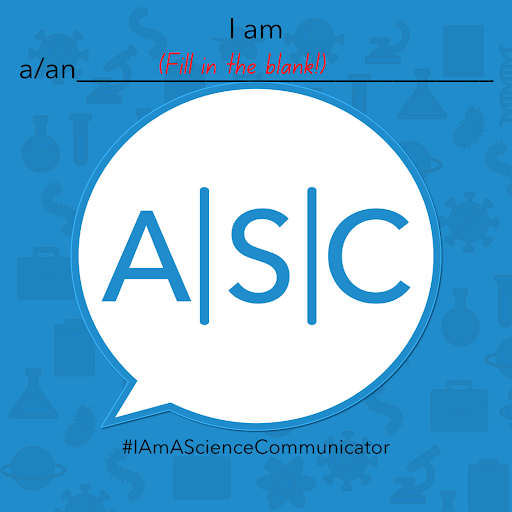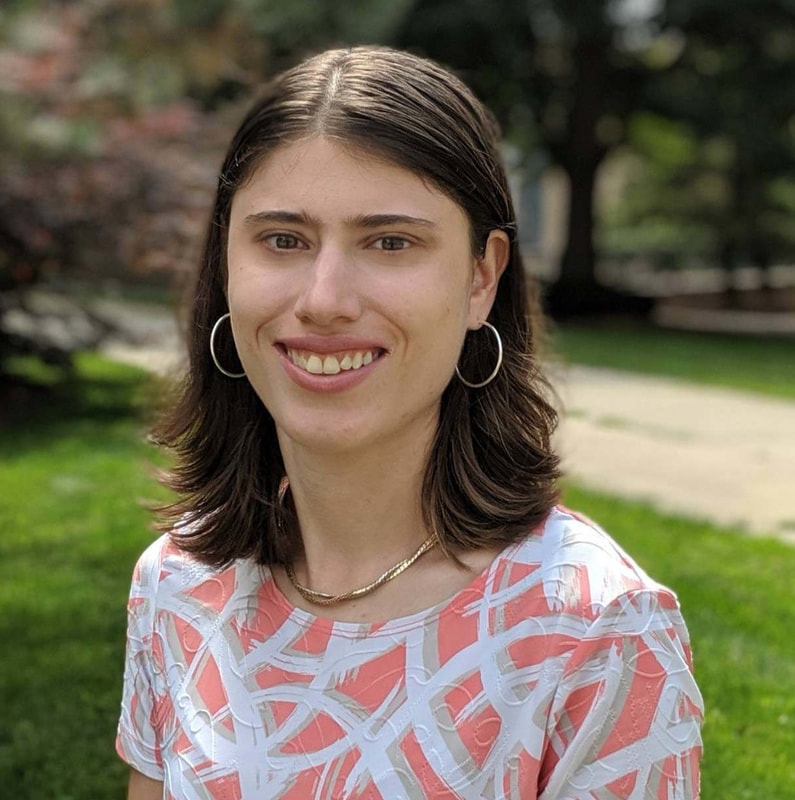ASC is personally asking our community to take two-minutes to review and digitally sign the below open letter, committing to 2023 as the year we build wide-reaching trust in science.
If you are looking for more information about our reasoning behind the letter, please visit this link.

Science has been politicized to the detriment of society and our collective futures. Better communication about science is needed, and now is the time for more people to see themselves and be accepted as science communicators
Science is spoken daily from your local TV meteorologist to your trusted car mechanic to your neighborhood garden shop green thumb. But most of these people who speak cold weather troughs, mechanical engineering, or plant biology professionally would never define themselves as science communicators. A disconnect exists between science and how people identify and talk about science in their lives. That needs to change.
Why is it important to broaden the definition of who can be a science communicator? Science is a human right. As leaders in the science communication community, we are very aware of the barriers that block access to science and that separate science from the everyday experience. We work to dismantle these obstacles because we know it will increase the availability of societally valuable opportunities. We need more people to identify with and take part in this effort. We need more ambassadors of science to build stronger connections between science and society.
Democratizing and increasing access to science worldwide is unquestionably more important than ever before. Most of the critical issues we are dealing with now, and the world’s most pressing problems going forward, are directly tied to science: climate change, the global pandemic, healthcare, agriculture, sustainable energy, and more. However, the political and social responses to our problems are based on people’s understanding and trust of the science behind those issues. We’ve seen the heavy influence of often subjective and self-selected resources and individuals. While some are likely to trust scientific publications, the majority turn to the people they know: family, friends, teachers, doctors, etc. These personal connections open doors to science communication.
Who is a science communicator? The researchers and the students making scientific discoveries are science communicators. Doctors, nurses, dentists, and other medical professionals are science communicators. Journalists writing on everything from climate change and life sciences, to politics, sports, and space are science communicators. Illustrators creating scientific drawings for textbooks or art for children’s books about tardigrades are science communicators. Chocolatiers leading tour groups on the chemistry behind chocolate are science communicators. Social media personalities. Government officials. Bartenders. Actors. Authors. These wide-ranging science communicators connect science to each person’s lived experience.
It’s more than just scientists communicating science, and we’re looking to empower those science communicators who might not yet realize they are one.
Now, as we enter 2023, is the time to band together. We are halfway through the UNESCO International Year of Basic Sciences for Sustainable Development, which aims to connect people to the concept that curiosity is the driving force for innovation. In the US, the White House Office of Science and Technology Policy has identified the importance of increasing public access and engagement with federally funded research, and 2023 is NASA’s Year of Open Science. How can we truly achieve “open science” without open science communication as well?
We invite science communicators from all walks of life to unapologetically embrace the communication of science to people around the world and support the universal right to science. Together, we pledge to build and energize an inclusive, diverse community of trusted experts and everyday science communicators. Join us in creating a dependable resource for science communicators to connect, gain inspiration and be empowered, so science communication can expand its potential to positively impact our world.
I am a science communicator.
Science communicators joining this letter do so in their individual capacities and not on behalf of the institutions with which they are affiliated.
Our non-profit organization, the Association of Science Communicators, provides resources and community for the people practicing and communicating science inside and outside of the lab. Our mission is to allow everyone to benefit from science communications research and collaborate on new solutions to tear down barriers to impactful science communications.
Initial Signatories
Allison Coffin, PhD
Co-founder and President of the Association of Science Communicators, Associate Professor of Neuroscience at Washington State University
Kirsten Sanford, PhD
Vice President of Public Relations at the Association of Science Communicators, Owner of Broader Impacts Productions, Host of This Week in Science
Please consider adding your name, title and email to sign this Open Letter through this form.
Some of our Co-Signatories to date:
Tamara Krinsky, Actress/Writer/TV Host – Discovery Channel/Science Channel’s TOMORROW’S WORLD TODAY
Sheril Kirshenbaum, Scientist, Author, Host of PBS Serving Up Science
Nalini Nadkarni, Scientist, science communicator, awardee of the AAAS Award for Public Engagement (2011) and the NSF Award for Public Service (2010)
John C. Besley, Ellis N. Brandt Professor, Science Communication Researcher and Author of “Strategic Science Communication”, Michigan State University
Laura Lindenfeld, Executive Director and Dean, Alan Alda Center for Communicating Science and School of Communication and Journalism
Sean Carroll, Homewood Professor of Natural Philosophy, John Hopkins University
Darlene Cavalier, Founder, SciStarter, Science Cheerleaders, ScienceNearMe + Co-Founder of ECAST
Andy Freeberg, Vice President of Partnerships & Sponsorships at the Association of Science Communicators, Head of Communications for Zap Energy
Colin Coleman, Clinical Affairs Associate, Paragon 28
Bre Kelsey, Vice President of Programming at the Association of Science Communicators, Disease Investigator at Snohomish County Health Dept
Eric Schudiske, CEO/Founder, s2s Public Relations and Communications
Jessica McNellis, Media Relations Manager, s2s Public Relations and Communications
Trevor Ainge, Public Relations and Digital Media Specialist, s2s Public Relations and Communications
Christopher Impey, University Distinguished Professor, University of Arizona
James Bell, Senior Advisor, Association of Science and Technology Centers
Claire Holesovsky, Chief Operations Officer, STEM Advocacy Institute
Kelly Johnson, Public Relations Specialist, s2s Public Relations and Communications Monae Verbeke, Director of Evaluation, Institute for Learning Innovation
Brian Palermo, Trainings Facilitator/Actor/Writer, Palermo Improv Training
Crystal Clarity, Chief Operating Officer, s2s Public Relations and Communication
Hazel J. Anderson, Ph.D. Student, MSU Science Festival Assistant Coordinator, Michigan State University
Skylar Knight, Communications Specialist, California Academy of Sciences
Andrea Isabel Lopez, Civic Science Fellow, Ciencia Puerto Rico
Aivy Nguyen, Student, University of Washington
John G. Radzilowicz, EdD, Director, Teaching Support, Center for Teaching & Learning, University of Pittsburgh
Emily Iskin, Graduate Research Assistant and AGU Voices for Science Advocate, Colorado State University
Scott Hershberger, Graduate Student in Science Communication, University of Wisconsin-Madison
Emma Giles, Citizen Science Program Coordinator, SciStarter Marlit Hayslett, PhD, CEO, Hayslett Consulting, LLC
Elise LeBovidge, PhD Candidate, University of Washington
Sky Hatter, Exhibit Manager, Discovery Gateway Children’s Museum Kate Bredbenner, PhD, Content Creator, SimpleBiologist
Steven Sobieszczyk, Vice President, Association of Science Communicators
Nic Bennett, Science Communication Researcher, The University of Texas at Austin
Meital Salmor, Science Communication Trainer and Strategist, Founder and Director, SciComm Skills
Sara Kobilka, Owner and Principal Consultant, Renaissance Woman Consulting
Katie Robertson Gziryan, Director of Public Affairs, Washington State University
Amelia V. Lamb, Publications Manager, Washington State Department of Commerce
Celia Cackowski, Education Specialist, Virginia Institute of Marine Science
Meagan Gombart, Outreach Manager, PDXWildlife
Matthew Facciani, Postdoctoral Researcher, University of Notre Dame
Valerie Bentivegna, Lab Manager, University of Washington
Glenn Prestwich, President, Clear Solutions Biomedical LLC
Joseph R. Kraus, Reference & Digital Repository Librarian, Colorado School of Mines
Naushin Raheema, Science Communicator/Writer
Vishruth M. Nagam,
Himani Arora, Science Communicator, Cambrian Bioworks
Alicia Cintron, Founder, (Cintron, Revised)
Loren DeVito, Author, Science Writer, Freelance
Melanie Peffer, SciComm Consultant & Teaching Assistant Professor, MKPEF4/University of Colorado Boulder
Alan Kolok, Professor, University of Idaho
Douglas K. Bostrom, Treasurer, General Factotum, Skeptical Science, Inc. (501(c)(3)) Jo Montgomery, Science Educator, Dr. Jo Science Solutions
Terri Chu, Ph.D Candidate – Science Communication, York University
Oscar Falcon Lara, Architect in Chief, Tam-FalconLara Design
Jenifer Henslee Peck, Science Translator and Communications Specialist, South Central Climate Adaptation Science Center
Elizabeth Crocker, Program Manager, Communications
Kitty Gifford, Instructor & Communications Consultant, Cornell University, Shoals Marine Laboratory, AreaHub.com, New York Soil Health, Sustainable Fingerlakes, Town of Newfield NY Climate Smart Communities Task Force
Marley Parker, Freelance Science Communicator, ML Parker Media
Kirsty Ross, PhD, EXPLORATHON Project Manager, Industrial Liaison Officer (StA) & Knowledge Exchange Associate (Strath), University of St Andrews & University of Strathclyde
Bruce Kirchoff, Professor Emeritus, University of North Carolina at Greensboro
Elisabeth Anderson, Director of Science Communication, Michigan State University, Center for Research on Ingredient Safety
Rosanna van Hespen
Vyshnavi Karra
Tyler Jones, Program Coordinator, SciCommers at BU
Ana G. Vergara, Senior Scientist, Merck



Leave a Reply